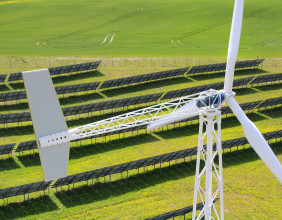Highlights
- Tesla Inc (TSLA) emerges as a key player in a high-level Japanese group's proposal for Nissan
- Strategic partnership discussions follow halted merger talks between Nissan and Honda
- Nissan shares surge as market sentiment shifts amid potential Tesla involvement
The automotive industry, a central segment within the global technology and transportation category, is undergoing rapid transformation driven by technological innovation and strategic collaboration. Major companies in the sector, including Nissan Motor Co (TYO:7201) and Tesla Inc (NASDAQ:TSLA), are continuously adjusting their approaches to remain competitive in a market increasingly focused on electrification and smart vehicle technology. Recent developments have placed Tesla at the heart of strategic discussions led by a prominent Japanese group that is now looking to enhance Nissan’s position in the United States, following the collapse of merger talks between Nissan and Honda.
Tesla’s Involvement in Strategic Discussions
Reports have emerged that a high-level Japanese consortium, involving influential figures such as a former Tesla board member and a former national leader, is proposing that Tesla explore a strategic role in Nissan's operations. The focus of this initiative is on Nissan’s manufacturing facilities in the United States, with the aim of leveraging Tesla’s technological expertise and production capabilities to strengthen Nissan’s domestic footprint. This potential collaboration comes after previous merger discussions between Nissan and Honda ended without an agreement, opening a new avenue for strategic partnerships in the evolving electric vehicle landscape.
The Context of the Nissan-Honda Merger Talks
Prior merger discussions between Nissan and Honda were seen as a significant opportunity for consolidation within the automotive sector. The intended alliance was designed to streamline operations, share technological innovations, and enhance market competitiveness in an era where electrification and smart vehicle technology are paramount. However, the talks collapsed amid concerns over corporate structure and control, leading Nissan to explore alternative partnerships that can provide similar strategic benefits without compromising individual brand identities. In this environment, the proposed involvement of Tesla has attracted attention as a potential means to rejuvenate Nissan's production and innovation capabilities.
Tesla’s Strategic Production Interests
Tesla, a recognized leader in the electric vehicle industry, is known for its groundbreaking production methodologies and advanced manufacturing processes. Its unique approach to vehicle production and digital integration has set benchmarks for efficiency and innovation. The possibility of Tesla playing a role in Nissan’s U.S. operations aligns with Tesla’s broader strategy to expand domestic production capacities and enhance operational efficiencies. This alignment is particularly relevant in a market where geopolitical factors and policy directives have increased the importance of localized manufacturing. By tapping into Tesla’s production expertise, Nissan may be able to optimize its manufacturing processes, thereby strengthening its competitive edge in a challenging global market.
Market Response and Share Performance
Following news of the potential strategic involvement of Tesla, market reactions have been notably positive for Nissan. Reports indicate a significant surge in Nissan's share prices, reflecting growing optimism among market participants regarding the benefits of this prospective partnership. The stock market’s response highlights the critical role of strategic narratives in influencing public perception and valuation metrics. The positive sentiment suggests that stakeholders view the collaboration as an opportunity to harness synergies between established automotive engineering and cutting-edge digital manufacturing. While Tesla’s leadership has publicly dismissed some of the speculative reports, the overall market reaction underscores the potential for strategic realignment to drive value in the automotive sector.
Implications for the Automotive Industry
The evolving dialogue around a potential Tesla-Nissan collaboration carries broader implications for the automotive industry. In an era marked by rapid technological shifts, traditional automakers are increasingly seeking alliances that allow them to access innovative technologies and improve operational efficiencies. Strategic partnerships such as this one can accelerate the development of next-generation electric vehicles by combining complementary strengths. For Nissan, aligning with Tesla could mean not only enhanced production capabilities but also a significant boost in technological know-how in areas such as battery management, autonomous systems, and digital connectivity. Such collaborations may set new industry benchmarks and compel other automakers to explore similar strategic relationships in order to remain competitive.
Navigating Geopolitical and Market Challenges
The potential strategic move by Tesla comes at a time when the global automotive industry faces numerous external challenges, including geopolitical tensions, fluctuating trade policies, and rapidly evolving regulatory landscapes. For Nissan, reinforcing its manufacturing capabilities in the United States is of particular importance, as localized production can mitigate the risks associated with international trade uncertainties and tariff pressures. By partnering with a technologically advanced firm like Tesla, Nissan could enhance its resilience in the face of these challenges, ensuring that its operations remain robust even as market conditions shift. The strategic focus on domestic production is also a response to the growing influence of Chinese electric vehicle manufacturers, whose rapid advancements are reshaping competitive dynamics in the global market.
Technological Synergies and Collaborative Innovation
At the heart of the proposed strategic partnership is the potential for significant technological synergies. Tesla’s prowess in digital manufacturing, artificial intelligence, and advanced production techniques can complement Nissan’s traditional strengths in automotive engineering. Joint efforts in research and development may lead to breakthrough innovations in electric vehicle design and functionality, offering consumers smarter and more efficient mobility solutions. As automakers race to meet the demands of an increasingly digital and environmentally conscious market, such collaborations can drive forward both product innovation and operational excellence. The integration of Tesla’s production methodologies with Nissan’s engineering capabilities represents a forward-thinking approach to addressing the challenges of the modern automotive landscape.
Shaping the Future of Electric Mobility
The automotive industry's shift toward electrification and smart technology is set to redefine market paradigms in the coming years. Strategic alliances between companies with complementary expertise will likely play a central role in shaping the future of mobility. The potential partnership between Tesla and Nissan exemplifies this trend, highlighting how traditional automakers can leverage digital innovation to transform their operations and product offerings. As both companies work to enhance their technological capabilities and streamline their production processes, the resulting collaboration may set a precedent for future partnerships across the sector. Such strategic realignments are essential in a rapidly evolving market where agility, innovation, and operational efficiency are paramount.
Navigating the Road Ahead
The discussions surrounding a potential strategic partnership between Tesla and Nissan underscore the dynamic nature of the automotive industry. With halted merger talks between Nissan and Honda creating a vacuum for alternative alliances, the proposed involvement of Tesla introduces a new dimension to strategic planning. As the industry continues to adapt to shifting technological and geopolitical landscapes, partnerships that combine the strengths of leading companies will be crucial for driving sustainable growth and innovation. By focusing on advanced manufacturing techniques, localized production, and digital integration, the automotive industry is poised to enter a new era of electrified and intelligent mobility.
The potential collaboration between Tesla Inc and Nissan Motor Co represents a pivotal development in the competitive landscape of electric vehicle production. As traditional automakers seek new avenues to enhance operational efficiency and technological capability, strategic partnerships emerge as a vital tool for navigating global market challenges and accelerating innovation. This evolving narrative will likely influence how companies approach long-term growth and shape the future of the automotive industry worldwide.




